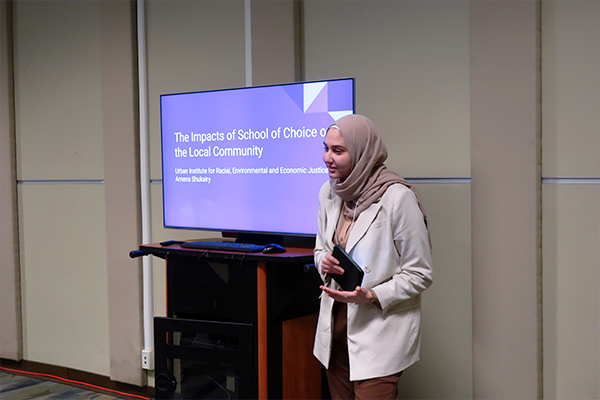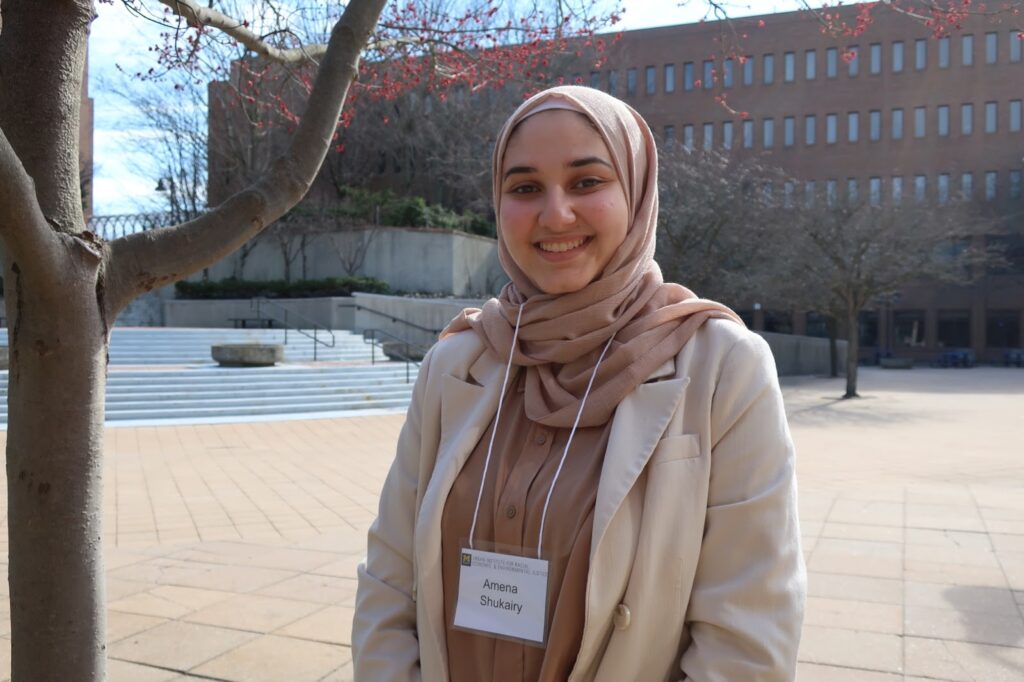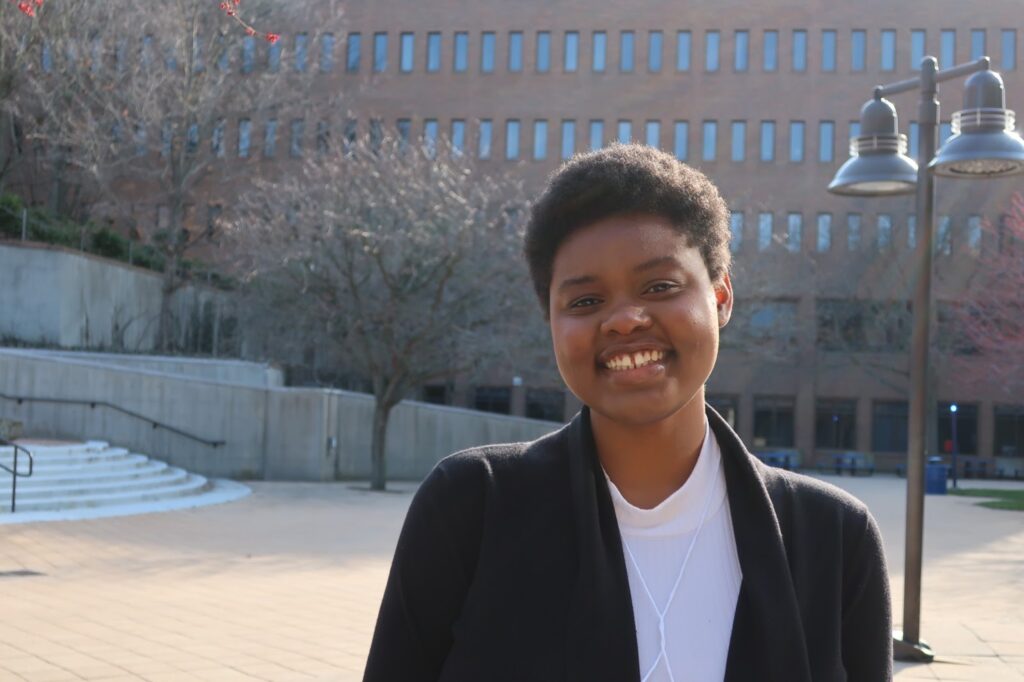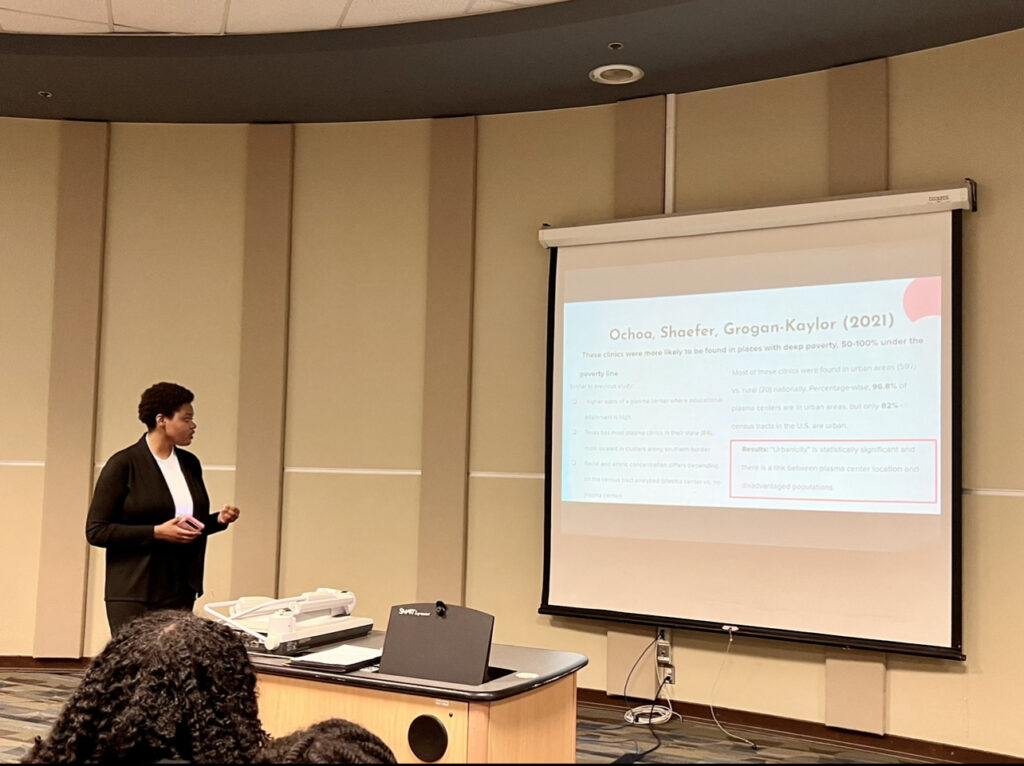
UIREEJ student intern Amena Shukairy presents her social impact project on April 12.
On April 12, the Office of Diversity, Equity and Inclusion (DEI) and the Urban Institute for Racial, Economic, and Environmental Justice (UIREEJ) hosted the first annual DEI/UIREEJ Spring Symposium. At the event, community members were immersed in social impact project presentations by UIREEJ student interns, who spent months researching and preparing their topics.
“UIREEJ offers students an opportunity to engage in community-based participatory research that promotes a sense of belonging, while engaging residents in social projects that have positive communal impact. Plus, students receive a significant stipend for their work and investment in developing their projects,” Nathaniel B. McClain, UIREEJ associate director said.
When the interns were introduced at the beginning of the symposium, executive director Jan Furman commended the students for their research efforts.
“Our interns embody the University of Michigan,” Furman said. “They are the leaders and the best.”
Read more about two of the social impact projects presented by students at the symposium.

Amena Shukairy: What impact does Michigan’s Schools of Choice policy have on the local community?
Senior Math TCP major and UIREEJ intern Amena Shukairy was substitute teaching when the idea for her social impact project became clear. Shukairy noticed the differences between two neighboring districts in the community. One district was improving financially and with diversity. The other was struggling.
“Substitute teaching really made me think about what is changing in the neighboring districts. That’s what really inspired this project,” Shukairy said.
In her social impact project, Shukairy was able to tackle how Schools of Choice impacts districts at a local level. With support from the UIREEJ, Shukairy worked in direct partnership with the Center for Educator Preparation, the School of Education and Human Services, the K-12 Partnerships Office, and the Future Teacher Organization to facilitate a panel discussion with educators, administrators, and a representative from the Michigan Department of Education to discuss the issue.
“The consequences of school choice are not that well known, so my original goal was to plant a seed, since a lot of people who attended the panel were future educators,” Shukairy said.
Shukairy says that the work from her social impact project is going to stick with her when she becomes a teacher after graduation.
“A part of being a teacher is advocacy and advocating for your students,” Shukairy said. “Having the information and knowledge of how funding works is going to help me in the future. I want all of our students to succeed, and I want to prioritize equity, especially when it comes to school funding.”

Jazlynne Cathey: Is there a disproportionate number of private plasma donation centers in areas with high social vulnerability?
Senior Molecular Biology and Biotechnology major and UIREEJ intern Jazlynne Cathey was riding in the car with her mom when she heard a radio advertisement about plasma donations. She became curious if these centers were placed in areas with higher social vulnerability. This led to the in-depth research presented at the symposium, where Cathey discussed the ethical implications and effects of plasma donations.
Cathey says that being an intern gave her the freedom to investigate her topic in an individualized way.
“Being an undergraduate student, this is an incredible opportunity. Not many undergraduate students get to just go off and do their own thing when it comes to doing a research project-especially not one like this,” Cathey said. “I think it’s important because on a community level, something like plasma donation needs to be expressed and looked at. Having the ability to do so and having people support you at this level of education is very rewarding.”
In addition to learning more about plasma donations, Cathey also developed science communication skills. She was able to learn how to make her information digestible for non-scientists, so more people could understand the topic.
“Sometimes what we talk about in science is gibberish, or it looks that way. I hoped to explain my project in a way that gets people interested and fired up. You don’t have to have a science-related degree in order to do something or want to understand something,” Cathey said.
Cathey hopes to continue the project’s work with first-year medical students and clinical surveys in the future.

For more information about the Urban Institute for Racial, Economic, and Environmental Justice (UIREEJ) and to learn how to become an intern, visit umflint.edu/uireej/.


